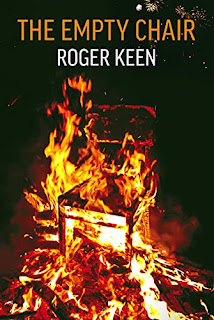The Empty Chair - Roger Keen
It's certainly a clever idea to filter the majority of those concerns though the semi-fictional/semi-autobiographical character of Steve Penhaligon, working in the 1980s for a regional TV company. Although he is stuck directing mundane news reports and gardening programmes, he nonetheless has grand ambitions to write and direct his own TV drama. Not so grand maybe, but it still seems impossible to get the necessary breaks unless you are able to mix in the right circles.
Continually preparing and revising scripts, Steve certainly has no shortage of material to draw on from his own life, much of it deriving from a troubled childhood relationship with his father that is causing him psychological problems as a young man. His use of recreational drugs including psychotropics hasn't helped his mental stability, but in other ways it enhances a unique view of the world and a restless, probing insight into exploring the workings of his own mind. Sessions with a psychotherapist give him temporary breakthroughs, but his professional life, his love live and his personal ambitions continue to provide frustrations that hamper any real progress. If only he can find a way to transform the rich world of the mind into a popular entertainment...
Suddenly things start to fall into place, but with doubts about Steve's relationship to reality and the truth, how much of The Empty Chair is real and how much is fantasy? Is there even a meaningful distinction between them? It perhaps doesn't matter what is 'real', what is imagined, how much is autobiographical and how much is fiction, how much is simply inspired by reality and how much is pure wish-fulfilment. All those dreams, musical, artistic and cinematic experiences play a vital role in what makes us who we are; it's all interconnected.
The Empty Chair is a big book, in more ways than one. Above all it's big in its ambition and most impressively, it's hugely successful in achieving what it sets out to do. There may be long stretches of self-examination and analysis by Steve, but there are loads of juicy incidents and it is never anything less than absorbing and fascinating to explore the complex inner workings of a human mind with Steve and the narrator. Particularly a troubled mind that is keen to step outside of itself and attempt to self-examine itself, and examine itself examining itself.
As you can imagine there are flaws in this approach, and being something of a metafiction Steve is not unaware of this either. It's not only a huge challenge for Steve, but it's an ambitious endeavour by Roger Keen to try and keep all these layers running and a formidable challenge for any writer to make all this rumination and self-absorption entertaining and readable. Striving to make life fit some kind of narrative means that you need to take it to a place where fantasy and reality can coexist in order to have a complete and honest picture of that process and find a greater truth. It soon becomes clear that the journey with all its side-steps and deviations is as vital to the purpose of self-discovery as arriving at any destination - perhaps even more so.
Some might find this some kind of self-indulgent postmodern Bildungsroman, but the reality is that it is easy to identify with Steve, and even if you have little in common with the everyday life of the author/narrator/character, it taps into the many levels of experience that define all of us that we perhaps don't examine quite so deeply ourselves, and that is quite a revelation. It's also more than documenting (and satirising) the personal neuroses of an ambitious young man trying to deal with his personal issues and make the big time, but like The Mad Artist before it, The Empty Chair taps into the difficult and fast moving societal changes and generational mind shift for the individual living through the 60s and 70s through to the heady 80s, 90s and beyond. Despite the challenges, Steve and Roger Keen succeed in meeting all the ambitions they set out to achieve, even if that is just the realisation of the remarkable book that you are holding in your hands.




Comments
Post a Comment